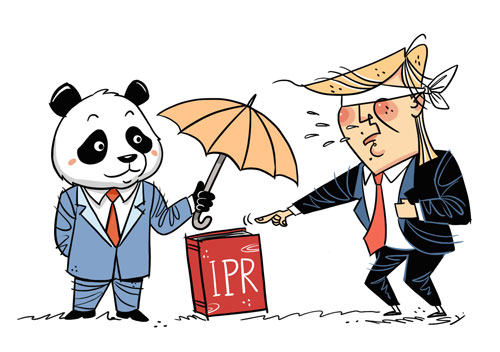US claims of unfair practices a 'distortion'






US accusations regarding China's business practices, including trade and intellectual property rights, are a "distortion of facts", the Ministry of Commerce said.
In a point-by-point response to allegations based on Section 301 of the US Trade Act of 1974, the ministry said slander from the United States against China about gaining extra advantage through unfair trade practices is groundless.
The ministry's statement, released on Thursday evening, reiterated that the US has overestimated its trade deficit with China and said the main reason for the situation does not lie with China. "Rather, it is because the savings rate in the US remains low, the US dollar serves as international reserve currency, and the two countries differ in industrial competitiveness and international division of labor," the statement said.
The document came amid a spiraling trade spat between the world's two largest economies. On July 10, US Trade Representative Robert Lighthizer issued a statement accusing China of "engaging in industrial policy which has resulted in the transfer and theft of intellectual property".
Taking issue with the "theft of intellectual property," the Ministry of Commerce said a full-fledged legal system has been put into place to protect IPR. China paid $28.6 billion in IPR royalties in 2017, a 15-fold increase from 2001, when it joined the World Trade Organization, the government said.
The ministry said domestic firms cooperate with foreign companies on a voluntary basis. China's industrial policies are guiding documents in nature and are open to all foreign-funded companies.
"The irony is that the country providing massive trade subsidies in agriculture and manufacturing happens to be the US itself," it said.
US researchers and officials have talked about resuming negotiations. In answering a question on whether high-level talks will be reopened and if he would participate, US Treasury Secretary Steven Mnuchin said, "Yes, I plan to participate. I would say to the extent that the Chinese want to make serious efforts to make structural changes, I and the administration are available anytime to discuss those," he said.
"I don't think we're in a trade war, we're in a situation of trade disputes," Mnuchin said, adding that his department is "very much monitoring the impact on the economy" from tariffs and the resulting retaliation.
Chinese officials and experts made it clear that trust is the precondition for negotiations.
From February to June, China engaged in four rounds of high-level economic talks with the US and announced the China-US Joint Statement, which included a consensus on strengthening trade and economic cooperation and avoiding a trade war.
"But due to domestic politics, the US has gone back on its word, brazenly abandoned the bilateral consensus, and insisted on fighting a trade war with China," the ministry said.































